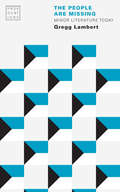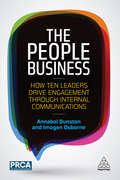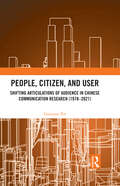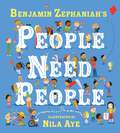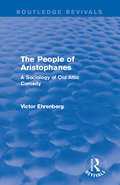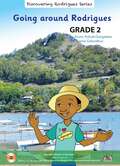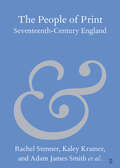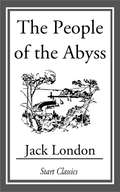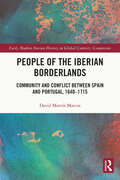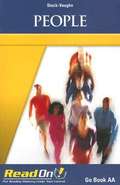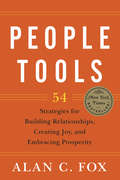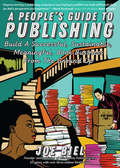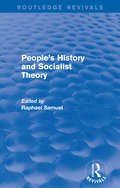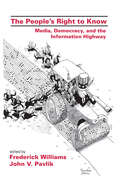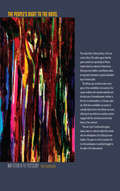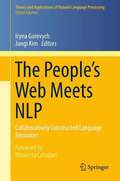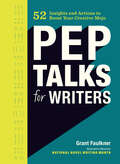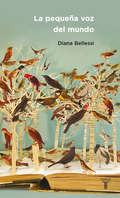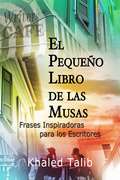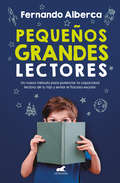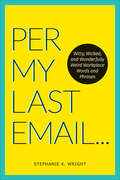- Table View
- List View
The People Are Missing: Minor Literature Today (Provocations)
by Gregg Lambert&“The people are missing&” is a constant refrain in Gilles Deleuze and Félix Guattari&’s writings after the 1975 publication of Kafka: Pour une litterature mineure. With the translation of this work into English (Kafka: Toward a Minor Literature) in 1986, the refrain quickly became a hallmark of political interpretation in the North American academy and was especially applied to the works of minorities and postcolonial writers. However, in the second cinema book, Cinéma 2: L&’Image-temps, the refrain is restricted to third-world cinema, in which Deleuze and Guattari locate the conditions of truly postwar political cinema: the absence, even the impossibility, of a people who would constitute its organic community. In this critical reflection, Gregg Lambert traces the &“narrowing&” of the refrain itself, as well as the premise that the act of art is capable of inventing the conditions of a &“people&” or a &“nation,&” and asks whether this results only in reducing the positive conditions of art and philosophy in the postmodern period. Lambert offers an unprecedented inquiry into the evolution of Deleuze&’s hopes for the revolutionary goals of minor literature and the related notion of the missing people in the conjuncture of contemporary critical theory.
The People Business: How Ten Leaders Drive Engagement Through Internal Communications
by Annabel Dunstan Imogen OsborneThe People Business offers readers a unique, inside perspective on what works and what doesn't in the world of corporate internal communication and strategy. Featuring interviews with senior practitioners from a diverse range of leading firms, the book offers a refreshingly honest perspective on the practices and challenges facing IC today. Senior IC leads will offer their tips for success, what they have learned along the way, and what remains challenging.The book will also explore how IC is still, in some companies, struggling to be seen as a credible contributor to business performance. The People Business enables readers to prove its value to senior company members by demonstrating its clear impact on ROI.
People, Citizen, and User: Shifting Articulations of Audience in Chinese Communication Research (1978 – 2021)
by Guiquan XuThe book examines the changing discourses of Chinese audience research in the past four decades, aiming to shed light on the complicated relationships among China’s media, audiences, and society. With the new sociology of knowledge, it adopts Laclau and Mouffe’s discourse theory as a meta-theoretical framework and interprets the concept of audience as a floating signifier. Based on the corpus of Chinese academic journal papers, the author divides the scope of analysis into four phases. In each period, Chinese audience research was related closely to the changing societal and academic contexts and hegemonic struggle as a whole. In addition, it discusses the relation between ‘western’ audience theories and Chinese audience research, as well as the contingency and rigidity of discourses in Chinese audience research. The book contributes to the understanding of Chinese communication research in the changing societal context and will be valuable for scholars of media and communication studies or China studies.
People Need People
by Benjamin ZephaniahTo walk toTo talk toTo cry and rely on,People will always need people . . .From the creators of Nature Trail comes an uplifting picture book about the power of people, and the importance of connecting with others. This timely poem reminds us all to be kind to one another.Written by legendary poet, Benjamin Zephaniah, one of The Times' top 50 British post-war writers. Beautifully illustrated by Nila Aye.Praise for Nature Trail:A joy to read with small children - Independent
The People of Aristophanes: A Sociology of Old Attic Comedy (Routledge Revivals)
by Victor EhrenbergFirst published in 1951, The People of Aristophanes provides a sociological account of Athens in the period of its greatest glory. Drawing upon Old Attic Comedy and the plays of Aristophanes, the author recreates, for the reader, the life of Athens at that time. He writes extensively about social structure, family, religion and political relationships within the state, and discusses the far-reaching changes which took place within Athenian society.
The People of Mauritius class 2 - MIE
by Aruna AnkiahGangadeen Seema Goburdhun"The People of Mauritius," part of the Literacy Pack curated by the Mauritius Institute of Education for Grade 2, presents a culturally enriching exploration of the island's diverse heritage. Through engaging storytelling and vibrant illustrations, the book delves into the ancestral origins of Mauritian people, showcasing the multicultural tapestry woven over generations. The narrative highlights how the great grandparents of different individuals hailed from various countries like India, Africa, China, and France, illustrating the amalgamation of different ethnicities within the Mauritian population. It aims to instill a sense of pride and belonging in young readers by celebrating the country's multiculturalism and emphasizing the importance of friendship and harmony among people from diverse backgrounds. The session activities included foster an interactive learning environment, encouraging discussions about ancestral roots, the significance of cultural diversity, and the value of friendship in a multiethnic society, reinforcing essential literacy skills and cultural understanding among Grade 2 learners.
The People of Print: Seventeenth-Century England (Elements in Publishing and Book Culture)
by Rachel Stenner Kaley Kramer Adam James Smith Georgina E. Wilson Joe Saunders William Clayton Jennifer Young Alan B. Farmer Benjamin Woodring Michael Durrant Verônica Calsoni Lima Rosalind JohnsonThis collection profiles understudied figures in the book and print trades of the seventeenth century. With an equal balance between women and men, it intervenes in the history of the trades, emphasising the broad range of material, cultural, and ideological work these people undertook. It offers a biographical introduction to each figure, placing them in their social, professional, and institutional settings. The collection considers varied print trade roles including that of the printer, publisher, paper-maker, and bookseller, as well as several specific trade networks and numerous textual forms. The biographies draw on extensive new archival research, with details of key sources for further study on each figure. Chronologically organised, this Element offers a primer both on numerous individual figures, and on the tribulations and innovations of the print trade in the century of revolution.
People of the Iberian Borderlands: Community and Conflict between Spain and Portugal, 1640–1715 (Early Modern Iberian History in Global Contexts)
by David Martín MarcosThis book is devoted to the inhabitants of the Spanish–Portuguese borderlands during the early modern period. It seeks to challenge a predominant historiography focused on the study of borderlands societies, relying exclusively on the antagonistic topics of subversion and the construction of boundaries. It states that by focusing just on one concept or another there is a restrictive understanding tending to condition the agency of local communities by external narratives. Thus, if traditionally border people were reduced by some scholars to actors of a struggle against a supposedly imposed border; in a more modern perspective, their behaviors have been also framed in bottom-up processes of consolidation of spaces of sovereignty in a no less limiting vision. Faced with both approaches, the objective of this work is not to deny them but, first and foremost, to situate the experiences of border populations outside of logics that I understand as originally alien to themselves, and to highlight their own subjectivity. Finally, it also demonstrates that most of the practices developed by border people were fundamentally aimed at defending their local communities. It will be useful for both audiences interested in early modern Iberia or border studies from a bottom-up perspective.
People of the Iberian Borderlands: Community and Conflict between Spain and Portugal, 1640–1715 (Early Modern Iberian History in Global Contexts)
by David Martín MarcosThis book is devoted to the inhabitants of the Spanish–Portuguese borderlands during the early modern period. It seeks to challenge a predominant historiography focused on the study of borderlands societies, relying exclusively on the antagonistic topics of subversion and the construction of boundaries. It states that by focusing just on one concept or another there is a restrictive understanding tending to condition the agency of local communities by external narratives. Thus, if traditionally border people were reduced by some scholars to actors of a struggle against a supposedly imposed border; in a more modern perspective, their behaviors have been also framed in bottom-up processes of consolidation of spaces of sovereignty in a no less limiting vision. Faced with both approaches, the objective of this work is not to deny them but, first and foremost, to situate the experiences of border populations outside of logics that I understand as originally alien to themselves, and to highlight their own subjectivity. Finally, it also demonstrates that most of the practices developed by border people were fundamentally aimed at defending their local communities.It will be useful for both audiences interested in early modern Iberia or border studies from a bottom-up perspective.
People (Read On! Go Book AA)
by Harcourt Achieve30 short stories designed to increase reading comprehension.
People Tools
by Alan C. FoxGetting along well with others is the real secret to success and happiness. In tens of thousands of classrooms we teach reading, writing, and arithmetic and yet we leave solutions to the universal problems of human relationships to be discovered, if at all, by trial and error. The trial is painful and the error is costly. People Tools: 54 Strategies for Building Relationships, Creating Joy, and Embracing Prosperity, provides time-proven techniques that you can use to build a better, happier, more successful life. It is the perfect resource for busy people looking for fast and effective solutions to the challenges we face every day. "People Tools" are practical and easy to understand. From developing self-confidence, to improving communication skills, to finding constructive ways to resolve conflict, each "People Tool" addresses a specific issue and provides a simple, straightforward strategy that you can adopt to bring about a positive result. Open the book to any page and you will find a useful solution. Each tool is illustrated with insightful stories and amusing anecdotes that are relevant and relatable. The stories will reel you in but the advice will change your life. "This book will do a lot for the world. " - Bill CosbyAlthough you may recognize the more intuitive techniques in People Tools, this sourcebook provides explanations and helpful examples from a vast collection of different tools designed to help you further expand your own existing repertoire of skills. Some of the useful "People Tools" in the book include:1. The Belt Buckle. When words are different than action (The Belt Buckle), trust the Belt Buckle, not the words. 2. Buy a Ticket. To make something good happen in your life you have to participate. 3. Catching a Feather. An alternative to the endless chase, this Tool reveals how to attract people you want to be closer to. 4. Patterns Persist. Prior actions are predictive of future behaviors. 5. Catch Them Being Good. Rewards are more effective than punishments. People Tools is organized into 54 chapters. Each chapter offers a life-changing insight. "Use them to live well, and your life will grow better for it. " -Jack Kornfield, psychologist, author, and founder of Spirit Rock Meditation Center
People Who Make a Difference, Research Companion
by James Banks Kevin P. Colleary William DeverellNIMAC-sourced textbook
People's Guide to Publishing: Building a Successful, Sustainable, Meaningful Book Business From the Ground Up
by Joe BielSo, you want to publish books.Drawing on 23 years of experience operating an independent publishing company, Joe Biel has written the most accessible and comprehensive guide to running a successful publishing business. You'll learn all the skills of the trade, including how to:Develop your individual books to connect with readers on a practical and emotional levelChoose between offset printed, digitally printed, and eBook formats and work effectively with printersBuild an authentic niche so you can reach your audience and sell books directlyUnderstand if and when you're ready to work with a distributor or large online retailerCreate a budget and predict the cost and income of each book so your company stays in the blackDecide what work you need to do yourself and what can be done by othersPlan for sustainable growthFeaturing interviews with other upstart independent publishers and funny anecdotes from publishing's long history as well as detailed charts and visuals, this book is intended both beginners looking for a realistic overview of the publishing or self-publishing process and for experienced publishers seeking a deeper understanding of accounting principles, ways to bring their books to new audiences, and how to advance their mission in a changing industry. All readers will come away with the confidence to move forward wisely and a strong sense of why publishing matters today more than ever.
People's History and Socialist Theory (Routledge Revivals)
by Raphael SamuelFirst published in 1981, this book brings together different types of work by numerous fragmented groups in the field of Marxist history and puts them in dialogue with each other. It takes stock of then recent work, explores the main new lines, and looks at the political and ideological circumstances shaping the direction of historical work, past and present. The scope of the book is international with contributions on African history, fascism and anti-fascism, French labour history, and the transition from feudalism to capitalism. It also incorporates feminist history and gives attention to some of the leading questions raised for social history by the women’s movement.
The People's Right To Know: Media, Democracy, and the Information Highway (LEA Telecommunications Series)
by John V. Pavlik Frederick WilliamsThis important volume presents the pros and cons of a national service that will meet the information needs and wants of all people. In the preface, Everette E. Dennis, Executive Director of The Freedom Forum Media Studies Center, asks, "What will a true information highway -- where most citizens enjoy a wide range of information services on demand -- do to local communities, government, and business entities, other units of society and democracy itself?" It is no longer a question of whether a vastly expanded "information highway" will be built in America. Telephone and cable companies have already inaugurated their plans, and government will most likely incorporate such plans into the economic development policy of the late 1990s. The key questions remaining are: Who will pay for it? and Whom exactly will it serve? The People's Right to Know suggests that serving the everyday citizen should be the main objective of any national initiatives in this area. It counsels that evolving electronic services are new communications media that should be deployed with a main focus on the public's needs, interests, and desires. If advances in the nation's public telephone network will make information services as easy to use as ordinary voice calls, or newspapers promise vast new electronic services awaiting their readers, more attention must also be devoted to the information needs and wants of everyday citizens. In our increasingly multicultural and technology-driven society, enormous inequities exist across America's socioeconomic classes regarding access to information critical to everyday life. If an information highway is to be effective, we need to ensure that all Americans have access to it; its design must start with the everyday citizen. This powerful new medium at our disposal must consider policy that includes attempts to close the information gap among our citizens. It must ensure equal access to data regarding job, education, and health information services; legal information on such topics as immigration; and transactional services that offer assistance on such routine but time-consuming tasks as renewing a driver's license or registering to vote. Media and telecommunications professionals, communication scholars, and policymakers, including two former chairmen of the Federal Communications Commission, provide insights and pointed commentary on the nature and shape of an information highway designed as a new public medium aimed at serving a wide range of public needs. Their work should improve our basis for deciding if there are means by which an enhanced public telecommunications network can benefit the everyday working American.
The People's Right to the Novel: War Fiction in the Postcolony
by Eleni CoundouriotisThis study offers a literary history of the war novel in Africa. Coundouriotis argues that this genre, aimed more specifically at African readers than the continent’s better-known bildungsroman tradition, nevertheless makes an important intervention in global understandings of human rights.The African war novel lies at the convergence of two sensibilities it encounters in European traditions: the naturalist aesthetic and the discourse of humanitarianism, whether in the form of sentimentalism or of human rights law. Both these sensibilities are present in culturally hybrid forms in the African war novel, reflecting its syncretism as a narrative practice engaged with the colonial and postcolonial history of the continent.The war novel, Coundouriotis argues, stakes claims to collective rights that contrast with the individualism of the bildungsroman tradition. The genre is a form of people’s history that participates in a political struggle for the rights of the dispossessed.
The People’s Web Meets NLP: Collaboratively Constructed Language Resources (Theory and Applications of Natural Language Processing)
by Iryna Gurevych Jungi KimCollaboratively Constructed Language Resources (CCLRs) such as Wikipedia, Wiktionary, Linked Open Data, and various resources developed using crowdsourcing techniques such as Games with a Purpose and Mechanical Turk have substantially contributed to the research in natural language processing (NLP). Various NLP tasks utilize such resources to substitute for or supplement conventional lexical semantic resources and linguistically annotated corpora. These resources also provide an extensive body of texts from which valuable knowledge is mined. There are an increasing number of community efforts to link and maintain multiple linguistic resources. This book aims offers comprehensive coverage of CCLR-related topics, including their construction, utilization in NLP tasks, and interlinkage and management. Various Bachelor/Master/Ph.D. programs in natural language processing, computational linguistics, and knowledge discovery can use this book both as the main text and as a supplementary reading. The book also provides a valuable reference guide for researchers and professionals for the above topics.
The People’s Web Meets NLP
by Iryna Gurevych Jungi Kim Nicoletta CalzolariCollaboratively Constructed Language Resources (CCLRs) such as Wikipedia, Wiktionary, Linked Open Data, and various resources developed using crowdsourcing techniques such as Games with a Purpose and Mechanical Turk have substantially contributed to the research in natural language processing (NLP). Various NLP tasks utilize such resources to substitute for or supplement conventional lexical semantic resources and linguistically annotated corpora. These resources also provide an extensive body of texts from which valuable knowledge is mined. There are an increasing number of community efforts to link and maintain multiple linguistic resources. This book aims offers comprehensive coverage of CCLR-related topics, including their construction, utilization in NLP tasks, and interlinkage and management. Various Bachelor/Master/Ph.D. programs in natural language processing, computational linguistics, and knowledge discovery can use this book both as the main text and as a supplementary reading. The book also provides a valuable reference guide for researchers and professionals for the above topics.
Peopling the World: Representing Human Mobility from Milton to Malthus
by Charlotte SussmanA compelling study of views about population and demographic mobility in the British long eighteenth centuryIn John Milton's Paradise Lost of 1667, Adam and Eve are promised they will produce a "race to fill the world," a thought that consoles them even after the trauma of the fall. By 1798, the idea that the world would one day be entirely filled by people had become, in Thomas Malthus's hands, a nightmarish vision. In Peopling the World, Charlotte Sussman asks how and why this shift took place. How did Britain's understanding of the value of reproduction, the vacancy of the planet, and the necessity of moving people around to fill its empty spaces change? Sussman addresses these questions through readings of texts by Malthus, Milton, Swift, Defoe, Goldsmith, Sir Walter Scott, Mary Shelley, and others, and by placing these authors in the context of debates about scientific innovation, emigration, cultural memory, and colonial settlement.Sussman argues that a shift in thinking about population and mobility occurred in the third quarter of the eighteenth century. Before that point, both political and literary texts were preoccupied with "useless" populations that could be made useful by being dispersed over Britain's domestic and colonial territories; after 1760, a concern with the depopulation caused by emigration began to take hold. She explains this change in terms of the interrelated developments of a labor theory of value, a new idea of national identity after the collapse of Britain's American empire, and a move from thinking of reproduction as a national resource to thinking of it as an individual choice. She places Malthus at the end of this history because he so decisively moved thinking about population away from a worldview in which there was always more space to be filled and toward the temporal inevitability of the whole world filling up with people.
Pep Talks for Writers: 52 Insights and Actions to Boost Your Creative Mojo
by Grant Faulkner“Will leave you feeling happier, bolder, and ridiculously excited about diving back into your writing projects.” —Chris Baty, author of No Plot? No Problem! and founder of NaNoWriMoEvery writer knows that as rewarding as the creative process is, it can often be a bumpy road. Have hope and keep at it! Designed to kick-start creativity, this handbook from the executive director of National Novel Writing Month (NaNoWriMo) gathers a wide range of insights and advice for writers at any stage of their career.From tips about how to finally start that story to helpful ideas about what to do when the words just aren’t quite coming out right, Pep Talks for Writers provides motivation, encouragement, and helpful exercises for writers of all stripes.
La pequeña voz del mundo
by Diana BellessiLos apuntes de Diana Bellesi sobre su oficio de poeta. Ganadora delPremio Nacional de Poesía 2011. La pequeña voz del mundo es la voz que escribe los poemas, la voz del poema que el poeta cree su voz. ¿Cuáles son las tareas de esta voz? ¿Cuál es el sentido último de la poesía disperso en tantos poemas diferentes y concentrado felizmente en un verso que se vuelve inolvidable? Diana Bellessi nos habla de la práctica del poeta en estas notas, escritas entre 1998 y 2010, que a veces son una búsqueda fragmentaria e íntima y a veces un texto para decir a viva voz. Definiciones en torno a la lírica, los alcances de su presencia en un mundo marcado por la exclusión, la esencia revulsiva del poema y su vínculo con la sociedad, pero también con la incertidumbre y con la fe, son algunos de los temas esenciales de que nos habla en este libro la principal poeta argentina contemporánea. La crítica ha dicho... «Sólo con una diferencia de grado respecto del poema, a veces los poetas escriben ensayos extraordinarios, a medias entre el saber y el manifiesto, que no sólo iluminan, como un relámpago teórico, la noción de lo que la poesía es o debería ser, sino también su propia poética, su fundamento reflexivo. Eso es La pequeña voz del mundo.» Jorge Monteleone, ADN Cultura «Bellessi convierte en ensayo aquello que ya era, y es, sustancia de su poesía, el mundo de intereses que componen su imaginario. El verso funciona en su obra como el puente capaz de reunir tópicos opuestos para la cultura: lo ínfimo y lo inabarcable, la naturaleza y la política, David y Goliat. Poesía lúcida la suya, poesía que esquiva el arquetipo divisionista que condiciona a la humanidad.» Paula Jiménez, Página 12 (Las 12)
El Pequeño Libro de las Musas
by Khaled Talib Lic. Liliana GandugliaEl Pequeño Libro de las Musas invita al lector a embarcarse en una travesía fantástica para descubrir la belleza de la palabra escrita. En sus páginas se encuentra una colección de curiosos dichos poéticos aparejados con una serenata lingüística, que invoca el alma del cuentista, y el espíritu cálido del escritor. Desde frases elegantes, expresiones humorísticas hasta reflexiones que desafían el pensamiento, este libro es delicioso para sorber té, meditar, sumergirse y obtener con frecuencia una dosis generosa de inspiración literaria.
Pequeños grandes lectores: Un nuevo método para potenciar la capacidad lectora de tu hijo y evitar el fracaso escolar
by Fernando AlbercaEl autor de Todos los niños pueden ser Einstein propone un nuevo método para potenciar la capacidad de comprensión lectora de tu hijo y evitar el fracaso escolar. «A todos los niños y niñas les gusta leer, pero muchos no lo hacen porque no han aprendido a hacerlo bien.», convencido de ello, Fernando Alberca, en este nuevo libro, defiende cómo y cuándo debe aprenderse a leer y cómo puede mejorarse la lectura de adolescentes y adultos. En este libro de Alberca, la idea fuerza es que «sí se puede» potenciar la inteligencia racional y emocional de nuestros hijos, aportando las herramientas necesarias para solucionar, obstáculos asociados a la lectura, a las dificultades que niños, adolescentes y adultos tienen con esta, llámense dislexia, comprensión lectora, cansancio, lentitud o lateralidad cruzada, así como las consecuencias negativas que estas pueden ocasionar a la autoestima y el fracaso escolar. Los juegos y ejercicios, que se presentan en este libro imprescindible para mejorar la lectura, han resultado ser muy eficaces y han tenido efectos extraordinarios en niños y niñas zurdos, con dislexia, TDAH, con lateralidad cruzada, síndrome de Down, altas capacidades u otras muchas circunstancias, pero sobre todo con niños y niñas y adolescentes que no presentan obstáculos visibles y sin embargo no leen con la fluidez y eficacia que podrían.
Per My Last Email: Witty, Wicked, and Wonderfully Weird Workplace Words and Phrases
by Stephanie K. WrightOffices are a breeding ground for odd expressions and hackneyed platitudes. Why are we peeling onions and putting irons in the fire? Why is our plate always full? And most importantly, how is it even possible to give 110%? Per My Last Email provides you with fresh new words to sprinkle throughout your workday and lift you out of your office-speak rut while making you laugh at the same time. With unexpected and entertaining phrases to boost the productivity of your meetings, revitalize your email game, and even the occasional office-appropriate swear, this book is a fun and informative send-up of stale corporate lingo that will help you freshen up your own workplace communication.
